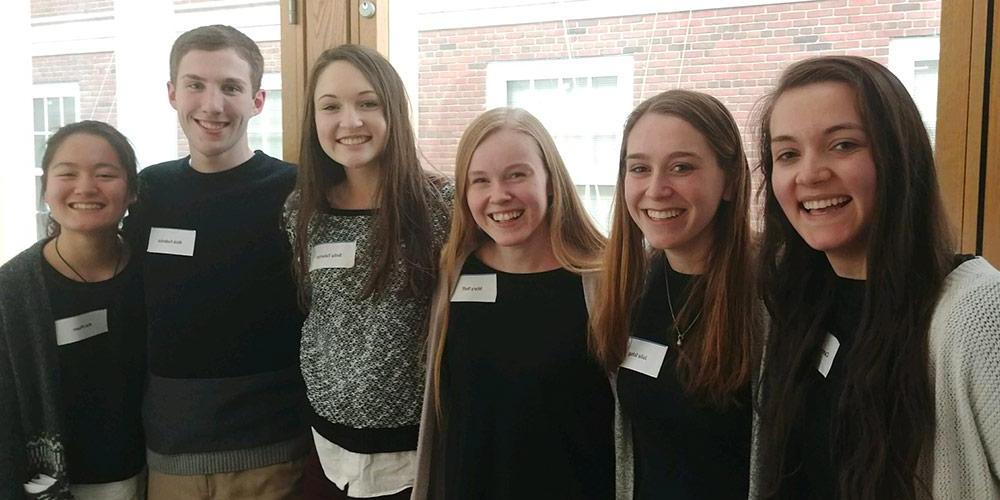The RMSP Curriculum
| MS-YR 1 | SUMMER | MS-YR 2 | MS-YR 3 | MS-YR4 |
|---|---|---|---|---|
|
Intro to Rural Health 1.5 Credits |
Design Partners 1 Credit |
Journey Mapping 1.5 Credits |
RMED 4 Credits |
Micro-Credential Capstone No Credit |
|
|
or 1 Credit |
|
|
or 2 Credits |
|
or Variable Credit |
or 1 Credit |
Rural Medicine Micro-Credential
The micro-credential in Rural Medicine is an educational experience that focuses on developing students interested in examining the opportunities and challenges related to rural or small-town practice. Medical students are eligible for the credential upon completion of: four core rural medicine courses and a signature capstone project. This credential will be highlighted in participants Dean’s letters for residency applications and participants will receive special recognition during graduation.
Introduction to Rural Health (FAMP1646)
This elective is required for medical students admitted to the Rural Medical Scholars Program. The course integrates meaningful community service with discussions of small-town practice. Students develop skills in teaching and mentorship, and clinical reasoning through case discussion. The course affords community preceptors an avenue to discuss the opportunities related to rural practice. For course credit, medical students teach a clinical case to teams of high school students in preparation of a case competition hosted by Upstate’s Rural Med Program.
Rural Medicine Design Partners (FAMP1656)
This teaching elective is offered to MS2s and MS4s. The course is designed to offer students with an interest in medical education the opportunity to create and implement educational activities through a near-to-peer teaching approach. Students develop session activities including: identifying unique topics, recruiting speakers, facilitating case discussions, and coaching high school students. Students have the opportunity to work on educational research including development, data collection and analysis, and manuscript writing. Upon completion, students are better prepared to be medical educators.
Rural Immersion Week (FAMP1651)
This elective runs the first week of June during the summer before second year. Students train at in-patient and out-patient community offices in host communities, working side-by-side with local physicians. Students meet with community leaders from various agencies including: local business owners, state assembly, public health, hospital administration, behavioral health and hospice. Students provide mentorship to high school students and are expected to spend a half day giving back to the community through scheduled volunteer activities.
RMED Lite Summer (FAMP1653)
The goal of this course is to provide a rich community-based summer experience to enhance the students’ clinical knowledge through hands-on practice and mentorship. Students are expected to: care for patients across the lifespan, manage acute and chronic conditions, as well as provide wellness and prevention care. Students work in RMED specialties: Surgery, Emergency and Family while also exploring additional specialties of interest while living and training at home.
Rural Medicine Clinical Training through Journey Mapping (FAMP1657)
For this elective second-year medical students delve into patient care through interactions with their patient educator and community preceptor. A small-town physician-patient team, alongside a fourth-year medical student, are matched with small groups of second-year students. Through guided sessions from August to January, the medical students come to know their patient and the patient’s condition, ultimately presenting their “case” at a university wide forum. Students practice skills related to: patient interviewing, notetaking, case review and discussion, physical exam and presentation.
Rural Medical Education Program (FAMP1650)
An elective course tied to a clinical site placement for 3 clerkships: Family Medicine, Surgery and Emergency Medicine. Students live and train in small town communities in NYS. An emphasis is placed on the continuous and comprehensive care of patients. Students develop skills in the diagnosis and management of a wide range of common ambulatory and secondary hospital problems of patients across the age spectrum. Students participate in office hours and conduct inpatient rounds, laboratory work, night call, and case presentations with small town, community-based attendings.
Rural Medicine Return to Basic Sciences through Journey Mapping and Teaching (FAMP1658)
For this elective fourth-year medical students are paired with community physician-patient teams to delve deeply into the anatomy and physiology of their patient’s condition, using their basic science knowledge and research skills. Students are to teach their second-year students how the disease progression impacts the patient, focusing on the pertinent basic science units from first- and second-year. Additionally, students present their cases via poster presentation at a university wide forum.
RMED AI (FAMP1652)
The goal of this community based Acting Internship is to prepare the 4th year medical student to assume the role of a first-year resident in caring for patients across the lifespan in an ambulatory Family Medicine Clinic, managing acute and chronic conditions, as well as providing wellness and prevention care. The Acting Internship will provide training and experience in the key components of outpatient primary care.
Rural Medicine Micro-Credential Signature Capstone
In Year 4, a student interested in the Rural Medicine Micro-Credential will submit a proposal and ultimately a final Capstone Project related to one of four rural health focus areas. Students will present their Capstone Project to program and university leaders at a Rural Health forum. NOTE: The Capstone Project may start as early as summer after Year 1 and develop overtime.

| Clinical Focus: Quality Improvement Project |
| Cultural Focus: Reflection: Qualitative Research |
| Advocacy Focus: Policy Brief |
| Teaching Focus: Mentoring, curriculum building |



